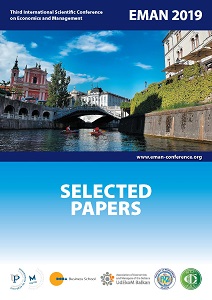MIGRATION AND MOBILITY OF QUALIFIED MILLENNIALS
MIGRATION AND MOBILITY OF QUALIFIED MILLENNIALS
Author(s): Alice Reissova, Jana Simsova
Subject(s): Migration Studies, Human Resources in Economy, Socio-Economic Research
Published by: Udruženje ekonomista i menadžera Balkana
Keywords: Labour mobility;labour migration;willingness to commute for work;gender differences;
Summary/Abstract: Currently, many companies face the problem of a lack of workers, including the most highly qualified ones. Employers are very interested in whether today’s young people are willing to commute or even move because of work. The purpose of this research was to answer these questions. The research group consisted of 1082 students of Jan Evangelista Purkyně University in Ústí nad Labem (Czech Republic). Students from all faculties, i.e. Faculty of Social and Economic Studies, Faculty of Mechanical Engineering, Faculty of Science, Faculty of Arts, Faculty of Education, Faculty of Health Studies, Faculty of Art and Design and Faculty of Environment, were involved. A written questionnaire was chosen as the method. The data was collected and processed using STATISTICA software. The statistical methods of the Mann-Whitney U Test, Kruskal-Wallis test, and the comparison of the parameters of two binomial distributions were used to evaluate the questions. The results indicate that the respondents from individual faculties show a similar willingness to commute to a job or, more precisely, to the amount of time they are willing to spend on the way. Differences, however, are in the willingness to move, both within the country and abroad. In this aspect, the students of the Faculty of Art and Design show the greatest willingness to move. The comparison of the students’ attitudes by gender shows very interesting results. Women are statistically less willing to commute to work as well as to move within the country or abroad than men. Their un/willingness to move might be motivated by the fact that they plan to have children. Thus, the students were asked whether they plan to have children within 3 to 5 years after finishing their studies and their willingness to commute or move was evaluated taking this aspect into consideration. The students that are planning to start a family are less willing to commute to work for longer than 1 hour or to move within the country or abroad. Statistically significant differences were also found within gender. Women who are planning to have children prefer to work only in the place of residence and are unwilling to move (within the country or abroad). Men who are planning to have children show a more negative attitude towards moving abroad unlike those that are not planning to have children. It is also interesting that there are differences in students’ plans to have children depending on the type of faculty they are studying. Most often, the students that plan to have children in less than 5 years after graduation are from the Faculty of Health Studies, of Arts and of Education. On the other hand, the smallest number of students that are planning to have children study at the Faculty of Mechanical Engineering and of Science. This result of the research is influenced by the ratio of registered men and women in each faculty. Women are planning to have children more often than men.
Book: EMAN 2019 / 3 – Economics & Management: How to Cope with Disrupted Times – Selected Papers
- Page Range: 135-142
- Page Count: 8
- Publication Year: 2019
- Language: English
- Content File-PDF

